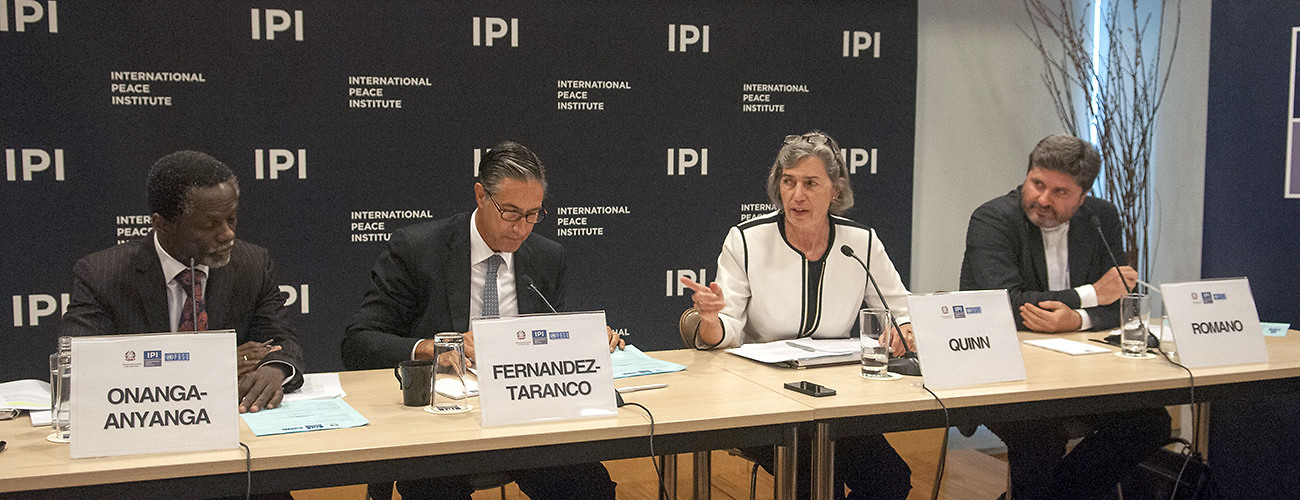The pursuit of dialogue is central to the practice of peacemaking and mediation, serving as an essential tool to consolidate peace in societies emerging from conflict, and many lessons can be drawn from the experiences of the East African country of Burundi. This was the topic of an IPI policy forum held on June 23rd, together with the Permanent Mission of Italy to the UN and the UN Peacebuilding Support Office.
After the assassination of Burundi’s first democratically elected president in 1993, widespread violence broke out between the Hutu and Tutsi ethnic groups, which intensified a year later and contributed to the genocide in Rwanda. Subsequently, Burundi descended into civil war for twelve years. Panelists reflected on the use of dialogue in Burundi, from the Arusha Accords in 2000 and the national dialogue process in 2009 to the current political crisis.
“The peace building architecture is key to the work of the United Nations today,” said Ambassador Sebastiano Cardi, Permanent Representative of Italy to the UN, during opening remarks. The UN needs to find a better balance between the three core areas of its work: mediation, peacekeeping and peacebuilding, he said.
Reflecting on his two years as the former special representative of the Secretary-General (SRSG) in Burundi, Parfait Onanga-Anyanga noted that the country was extremely polarized, and it had looked like an impossible task to bring together the diverging camps to the negotiating table.
When Mr. Onanga left Burundi in 2014, he said the government was eager to assume its sovereign right to be in charge of the country’s political governance. By then, Burundi was in relative peace and stability, having agreed upon a comprehensive, strategic framework for its future and development.
Current President Pierre Nkurunziza’s decision to run for a third term has led to protests, violence, and political tensions from opponents who see it as a violation of the country’s constitution. “We knew the elephant in the room for the country would be the third term,” he argued, highlighting that it was a matter of concern since elections in the country were a trigger for conflict. Mr. Onanga noted that today, the worry is that the dialogue is in bad shape.
Oscar Fernandez-Taranco, UN assistant secretary-general for peacebuilding support, said that Burundi was the first country to come to the attention of the Peacebuilding Commission.
One consistent thread that ran since 2006-2007 was support to dialogue, he said. “Part of the challenges to peace building is this notion of inclusive, political dialogue. Peace building is highly political.”
According to Mr. Fernandez, Burundi has received the most funding from the Peacebuilding Fund, which has been supporting the democratic process of participation, inclusion, and dialogue.
A boycott by the opposition of the elections in 2010 and its consequences suggest, he argued, that “external interventions have limitations in terms of the internal processes that are needed. The issue of national ownership and national leadership need to really be catered for and paid special attention.”
“The post-2010 landscape brought new challenges in terms of trust between citizens and states, and that needed to be ascertained,” he asserted, noting that it’s challenging for external actors to facilitate national dialogue when trust and leadership are not present with national stakeholders. “Dialogue is a fundamental part of establishing trust.”
The biggest challenge for peacebuilding in Burundi, going forward, will be how the participants of the process will be more inclusive and prepared on the ground for the day after the elections, he said.
Bringing in a historical perspective was Angelo Romano, a member of the International Department of the Community of Sant’Egidio. Mr. Romano said the people of the country are remarkable and there is a dignity, tradition and story of the country that existed as a kingdom since the 17th century.
“Nobody has the magic key to solve the problem in Burundi, but we need each other,” he said. “We need the international community, we need the regional countries, we need civil society, and we need religious leaders too. We must create a positive synergy… We must keep the African perspective on issues of democracy, freedom and civil rights.”
Mr. Romano expressed his concern about the present situation in Burundi and emphasized that the country is different now than in 1995. The population of Burundi wants peace, he said, and the country can be an example not only for Africa but for the world.
The conversation was moderated by Ambassador Maureen Quinn, Senior Director of Programs at IPI.
Watch event:








